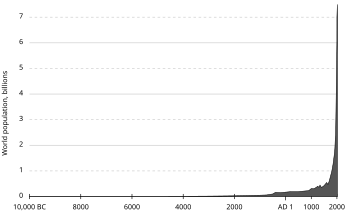
The doomsday argument (DA), or Carter catastrophe, is a probabilistic argument that claims to predict the future population of the human species based on an estimation of the number of humans born to date. The doomsday argument was originally proposed by the astrophysicist Brandon Carter in 1983,[1] leading to the initial name of the Carter catastrophe. The argument was subsequently championed by the philosopher John A. Leslie and has since been independently conceived by J. Richard Gott[2] and Holger Bech Nielsen.[3] Similar principles of eschatology were proposed earlier by Heinz von Foerster, among others. A more general form was given earlier in the Lindy effect,[4] which proposes that for certain phenomena, the future life expectancy is proportional to (though not necessarily equal to) the current age and is based on a decreasing mortality rate over time.
- ^ Brandon Carter; McCrea, W. H. (1983). "The anthropic principle and its implications for biological evolution". Philosophical Transactions of the Royal Society of London. A310 (1512): 347–363. Bibcode:1983RSPTA.310..347C. doi:10.1098/rsta.1983.0096. S2CID 92330878.
- ^ J. Richard Gott, III (1993). "Implications of the Copernican principle for our future prospects". Nature. 363 (6427): 315–319. Bibcode:1993Natur.363..315G. doi:10.1038/363315a0. S2CID 4252750.
- ^ Holger Bech Nielsen (1989). "Random dynamics and relations between the number of fermion generations and the fine structure constants". Acta Physica Polonica. B20: 427–468.
- ^ Humphrey, Colman (2014). "Predicting Future Lifespan: The Lindy Effect, Gott's Predictions and Caves' Corrections, and Confidence Intervals". Archived from the original on 2016-03-28.